Are you ready to be unforgettable on social media?
In this guide, we strip away the fluff to deliver the hard-hitting truths and actionable strategies you need to elevate your brand on socials.
From crafting a winning plan to navigating the best platforms for your content, we've uncovered the essence of social media marketing into bite-sized, impactful insights.
So let’s discover the secrets behind engaging posts, viral campaigns, and lasting connections with your audience.
Table of contents
- What is social media marketing?
- Benefits of social media in marketing
- Key pillars of a social media marketing strategy
- How to create a social media marketing plan
- Social media marketing tips
- The best social media marketing platforms
- Social media marketing services: in-house vs. agency
- Social media marketing courses
What is social media marketing?
Social media marketing is the strategic process of promoting a brand, product, or service through social platforms.
Strategically using social media for marketing can help you enhance brand visibility, foster loyalty, and drive sales.
Marketing through social media involves a sophisticated mix of targeted advertising, engaging directly with your audience, and analyzing data to optimize campaigns.
By harnessing the unique characteristics of each platform, whether it's the visual appeal of Instagram, the brevity of X (Twitter), or the community focus of TikTok, social media marketers craft messages that resonate on a personal level with their audience.
Key steps to cover when using social media in marketing include content creation that aligns with brand identity, leveraging influencer partnerships to extend reach, and fostering real-time interaction to maintain a dynamic presence.
Nonetheless, an effective strategy for social taps into current trends and consumer behavior to ensure that the brand remains relevant and compelling in the ever-evolving digital landscape.
Benefits of social media in marketing
Using social platforms for business promotion stands as a cornerstone in contemporary digital marketing strategies, blending innovation and traditional marketing principles to foster brand growth and customer engagement.
Here are some key benefits of social media marketing:
- A wider reach: Using social media for marketing allows brands to connect with potential customers across the globe or target specific demographics with precision.
- Brand awareness and recognition: Through consistent social media marketing strategies, brands can increase visibility and recognition. Engaging content can be shared widely, helping to introduce the brand to new audiences and keep it top of mind among existing followers.
- Boosted engagement: Marketing through social media enables direct and real-time interaction with target audiences. Brands can engage in conversations, respond to queries, and collect feedback promptly. This level of engagement helps build stronger relationships with customers and enhances loyalty.
- Cost-effectiveness: Compared to traditional promotional channels like TV, radio, or print media, social media for marketing can be more cost-effective, especially for small and medium-sized businesses. Even with limited budgets, businesses can reach a wide audience, engage with customers, and build brand awareness.
- Insights and analytics: Social media marketing tools provide valuable data about audience demographics, engagement rates, and content performance. These insights help businesses tailor their strategies, content, and advertising to better meet their audience's needs and preferences.
- Increased website traffic: By sharing content that links back to their websites, brands can use social networks to increase web traffic. This can lead to higher conversion rates, more sales, and improved search engine ranking.
- Influencer collaboration: Influencer collaboration, a key aspect of social media influencer marketing, introduces brands to new audiences and boosts credibility, highlighting the benefits of marketing on social media.
- Crisis management: Crisis management via social networks allows brands to quickly address, clarify, and engage on issues, mitigating reputation damage, and underscoring its role in effective strategies for social media marketing and advertising.
Key pillars of a social media marketing plan
A marketing strategy for social media is a comprehensive plan that outlines how a business or organization will use social platforms to achieve its promotional and branding goals.
This strategy typically includes objectives, target audience identification, content planning and creation, engagement tactics, advertising strategies, and methods for measuring success.
Marketing and social media have evolved from merely publishing content to drive website traffic and sales into a versatile tool for brand engagement.
Brands now monitor social conversations and respond to mentions, analyze social performance using analytics, and reach targeted audiences with precise advertising.
So, what is advertising on social all about?
Budgeting
Financial resources play a very important role in social media marketing for businesses.
From content production to paid social media ads, it’s critical to establish a clear budget that aligns with your goals.
Setting aside funds for boosting posts, running ad campaigns, and using analytics tools can help you reach a broader audience and measure the success of your initiatives.
Resource allocation
An effective social media plan must take into account the resources needed to execute the strategy.
Thus, allocating the right people with the right skill sets — from content creators and designers to social media marketers and analysts — ensures that all aspects of your plan are handled well.
Effective social media marketing often relies on the coordination of multiple teams, so ensuring you have enough people in place to support your efforts is key to avoiding burnout and inefficiencies.
Strategy
Developing a strategic action plan is the first step when running social media marketing campaigns , providing direction to the content that will be published.
This approach is essential because it serves as a foundational pillar that guides all initiatives on these platforms.
It helps you define clear objectives, ensuring your efforts contribute directly to your business goals, such as increasing brand awareness, driving sales, or improving customer engagement.
By choosing the right platforms and types of content based on a deep understanding of your target audience, you can more effectively allocate resources, engage your audience, and measure success.
Without a strategic foundation, social media efforts can become unfocused, wasting time and resources without delivering meaningful results.
Content creation
Sharing on social can be as straightforward as posting a blog, photo, or video, much like you would on your personal accounts.
However, it's important to strategize and schedule your content rather than posting on the fly.
To maximize social impact, publish engaging content that resonates with your audience, and timed perfectly for optimal reach and frequency.
Regarding planning and publishing, these elements are fundamental to social marketing.
They ensure content is thoughtfully prepared and distributed effectively, laying the foundation for building audience engagement and achieving marketing objectives.
Listening and engagement
As your business and its social presence expand, so will conversations about your brand.
Users will engage with your posts, tag you, or message directly, and some may mention your brand without tagging you.
Monitoring these conversations is crucial.
Positive feedback presents an opportunity to surprise and delight while addressing negative comments can prevent issues from escalating.
Listening and engagement are vital to a digital promotional strategy because they allow you to understand customer perceptions and directly interact with your audience.
This feedback loop strengthens relationships, builds loyalty, and can improve your offerings based on real user insights.
Analytics and reporting
While managing your social activities, from publishing content to engaging with users, it's essential to track the performance of your advertising efforts.
Key metrics to monitor in your marketing plan for social media include the growth of your social reach compared to previous months, the volume of positive mentions, and the frequency of your brand's hashtag use in posts.
Analytics and reporting serve as critical components of social media brand marketing because they provide insights into the effectiveness of your strategies.
By understanding these metrics, you can refine your approach, identify what resonates with your audience, and enhance overall engagement and brand visibility.
Integrating a third-party tool such as Socialinsider into your social strategy can elevate your approach by providing comprehensive analytics and reporting.
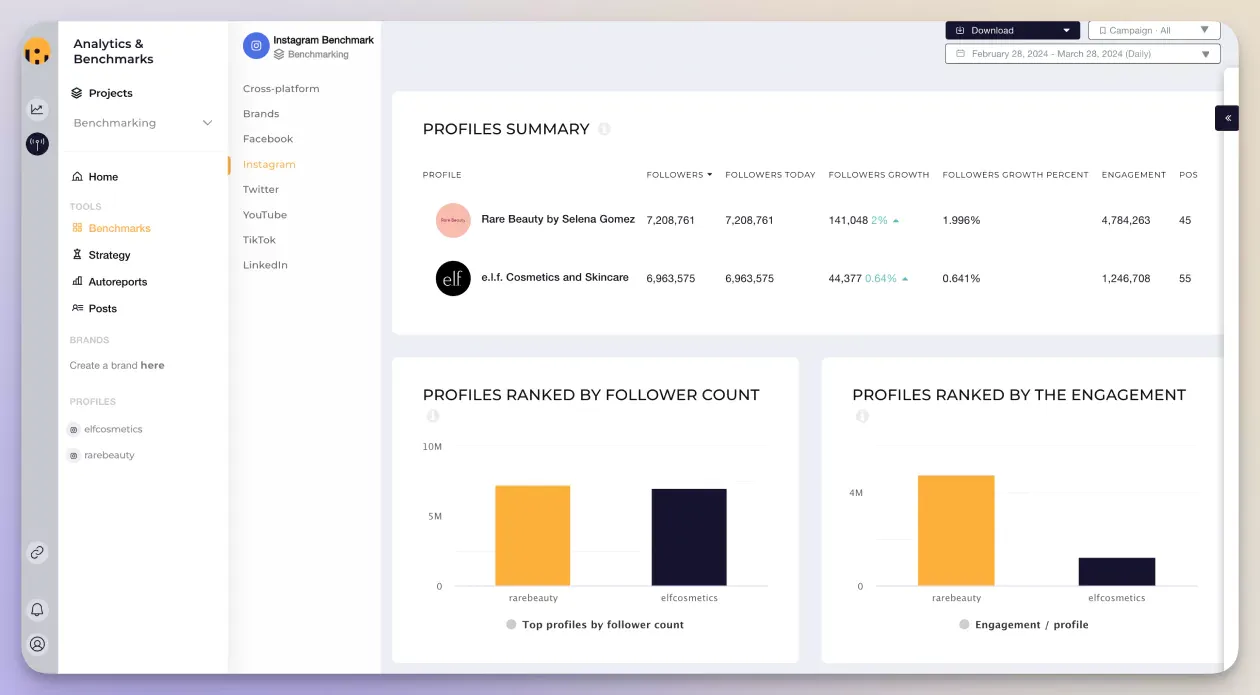
As the screenshot suggests, Socialinsider can track and compare the performance of different social profiles.
In this case, the charts displayed indicate the follower count and engagement rate, offering a clear visual representation of how these profiles fare in terms of audience size and interaction.
Such insights are crucial for marketers to analyze their social strategy, understand audience behavior, and adjust their content to foster growth and engagement.
By benchmarking against industry standards or competitors, Socialinsider helps in making informed decisions to enhance social presence.
With the ability to track campaign performance, marketers can make timely adjustments to optimize their efforts and maximize their impact.
Overall, Socialinsider empowers brands to develop more effective social media marketing tactics by facilitating data-driven decision-making, continuous optimization, and improved audience engagement.
How to create a social media marketing plan
Crafting an effective social media marketing plan requires a deep understanding of one's audience, clear objectives, and the seamless integration of various social media marketing tools.
However, creating a social media plan is also a dynamic process.
It requires ongoing attention and adjustment to respond to new trends, platform changes, and the evolving interests of your audience.
By following these steps, you'll be well on your way to building a strong social presence that supports your business goals:
Set clear objectives
Establishing clear objectives is the first step in developing an effective action plan for promoting your brand on social.
These objectives could range from increasing brand awareness and driving website traffic to generating leads or boosting sales.
Having well-defined goals serves as a roadmap for your digital strategies, providing direction and focus to your efforts.
Additionally, it allows you to measure the effectiveness of your campaigns and make adjustments as needed to achieve desired outcomes.
In essence, setting clear objectives ensures that your efforts are purposeful, measurable, and aligned with your overall business goals.
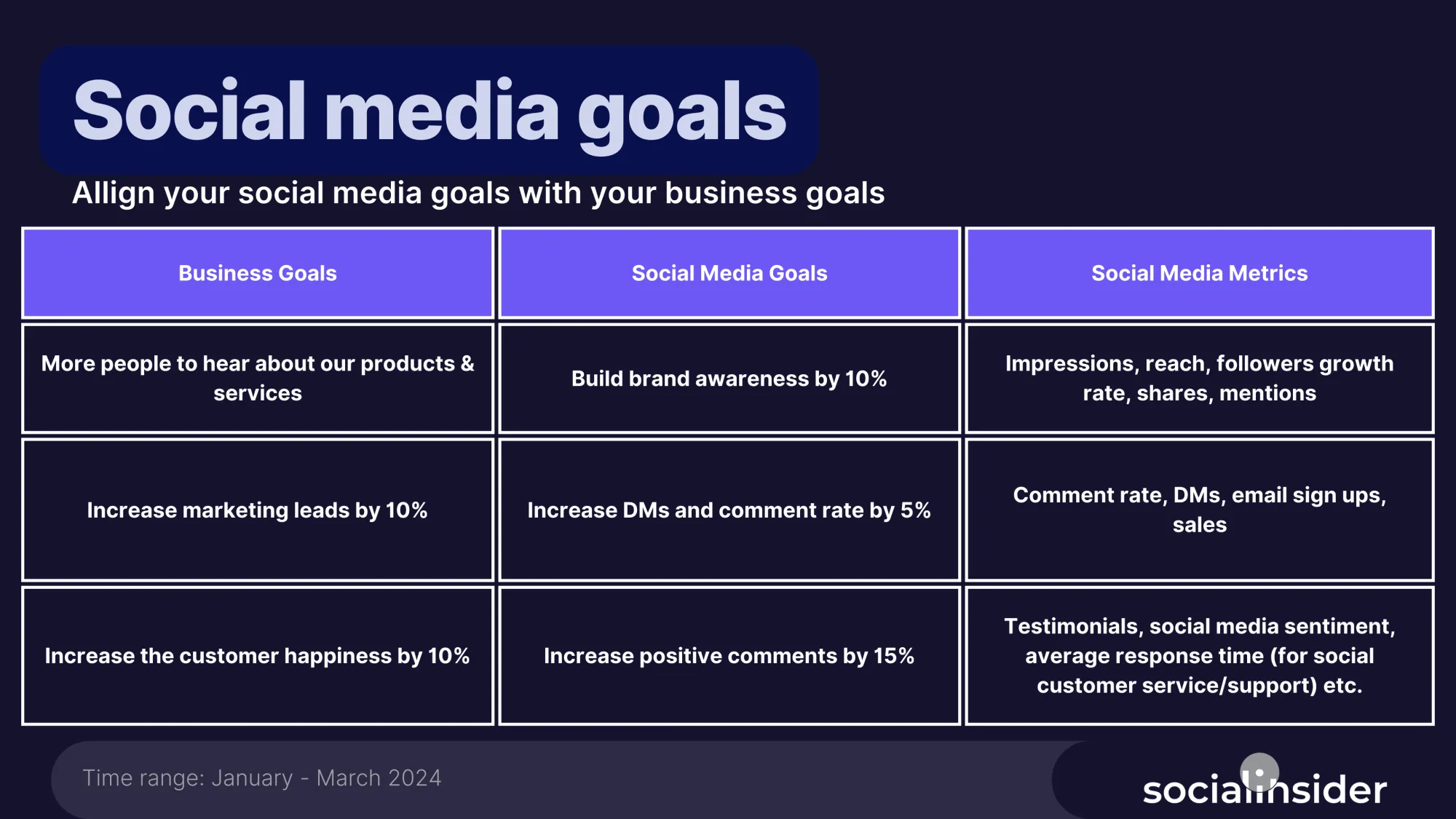
Identify your target audience
Identifying your target audience is pivotal in any promotional activity.
A well-defined target audience enables you to craft content that speaks directly to their interests, preferences, and pain points.
By doing so, you can establish a deeper connection with your audience, fostering loyalty and trust over time.
Moreover, understanding your audience's demographics, behaviors, and psychographics empowers you to choose the most appropriate social platforms and tools for reaching them effectively.
Furthermore, identifying your target audience allows you to refine your social media marketing goals and metrics.
Whether your objective is to drive brand awareness, generate leads, or increase sales, knowing who you are targeting enables you to set realistic benchmarks and track your progress accurately.
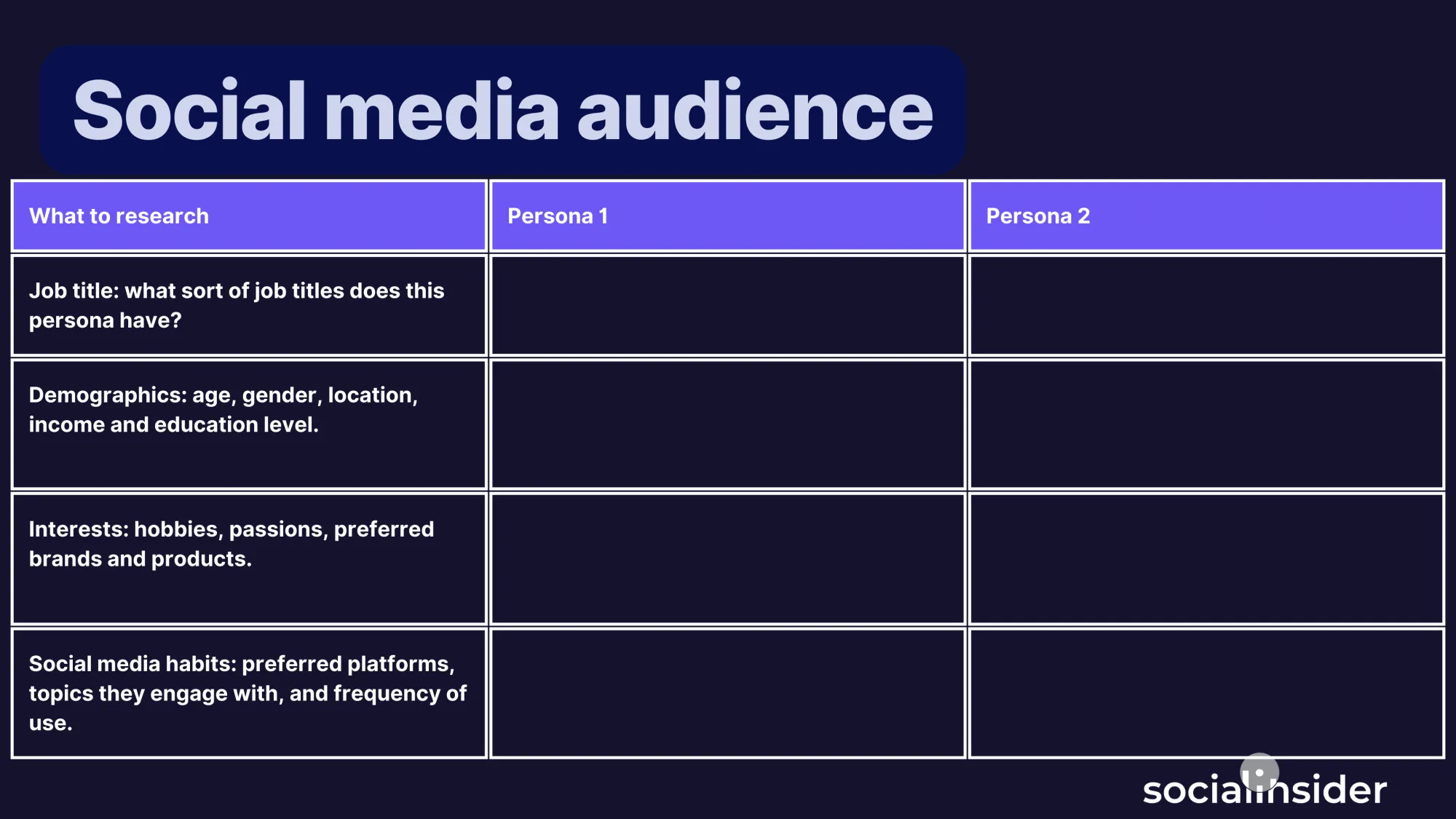
Conduct a competitive analysis
Conducting a thorough analysis of your competitors' activities on social can gather invaluable insights.
By meticulously examining their successes and shortcomings, you can pinpoint the tactics that resonate with your shared audience.
This comprehensive competitive analysis is crucial for developing nuanced social strategies.
Such insights not only enable you to tailor your approach to better meet the needs of your target audience but also provide a strong foundation for distinguishing your brand in a crowded marketplace.
Select the right platforms
Selecting the right social platforms is a critical step in optimizing your efforts on promoting your brand on social.
It’s essential to conduct thorough research to determine where your target audience is most actively engaged.
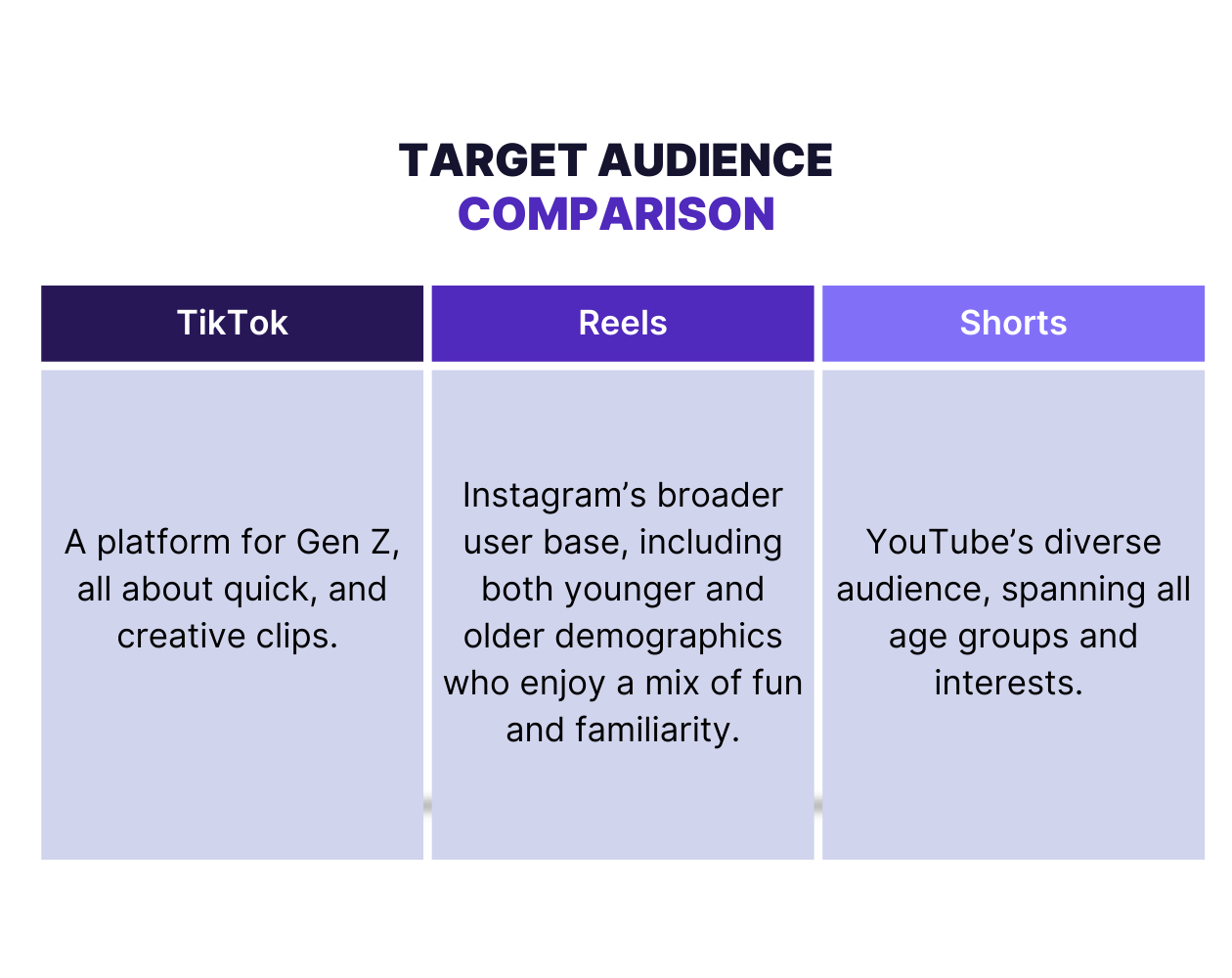
Engaging in digital social media marketing requires a nuanced understanding of each platform's unique features and user base.
Different platforms cater to varied demographics and interests, making it crucial to tailor your approach accordingly.
For businesses targeting professional users or other companies, LinkedIn offers a prime environment for B2B marketing, thanks to its professional network and industry-focused discussions.
Conversely, Instagram, with its visually rich format, is exceptionally suited for brands that aim to attract younger consumers through compelling images and videos, making it ideal for consumer-centric products and lifestyle branding.
Plan your content calendar
Developing a meticulous content calendar is a pivotal step in refining your social activity plan.
Incorporating such a calendar is instrumental in maintaining a consistent posting schedule, a key factor that underpins audience engagement and fosters substantial growth.
To effectively leverage a content calendar for your efforts, start by identifying key dates that are relevant to your audience, such as holidays, industry events, or product launch dates.
This will ensure your content is timely and resonates more deeply with your followers.
Additionally, diversify your content types to include a mix of videos, images, infographics, and blog posts to cater to different preferences and increase engagement.
Each piece of content should serve a purpose, whether it's to educate, entertain, inspire, or promote your brand.
Analyze the performance of your posts regularly to identify patterns and adjust your strategy accordingly.
For instance, if you notice higher engagement rates on certain days of the week or times of day, schedule your most important content accordingly.
Finally, use social media management tools to automate posting and free up time to engage with your audience.
By effectively planning your social media marketing campaigns in this manner, you ensure that every piece of content is aligned with your overall social media marketing goals, resonates with your target audience, and leverages the unique strengths of each social media marketing channel.
Create engaging content
Crafting compelling content is the cornerstone of any successful advertising strategy.
Increasing your engagement on Facebook, Instagram or any other social media platform that is important for your brand, is key to building a strong relationship with your audience.
A diverse blend of content types—such as images, videos, blogs, and infographics—can captivate your audience and sustain their interest.
It's important to strike a balance between promotional material and content that provides genuine value, ensuring your social presence resonates with and enriches your audience's experience.
This approach not only fosters engagement but also strengthens your brand's connection with its followers.
Team up with influencers
Leveraging social media influencer marketing can significantly amplify your brand's visibility and credibility.
To maximize the benefits of this strategy, it’s essential to choose influencers whose values and online persona align with your brand identity, ensuring a natural and cohesive partnership.
Furthermore, by engaging in creative and mutually beneficial collaborations, such as sponsored content, product reviews, or exclusive giveaways, you can effectively leverage social media and marketing tactics to captivate an audience and drive engagement.
Using social media for marketing in this way taps into the influencer's credibility, creating a persuasive and impactful advertising channel that can lead to increased brand awareness, customer loyalty, and ultimately, sales.
Monitor and analyze your results
Monitoring and analyzing your KPIs is essential for optimizing your strategies and achieving your objectives.
Leveraging social media analytics tools enables you to track the performance of your posts and campaigns effectively.
By analyzing metrics such as engagement rates, reach, and the performance of individual posts, you gain valuable insights into what resonates with your audience and what doesn't.
This data-driven approach allows you to make informed decisions and adjustments to your strategy, focusing resources on tactics that yield the best results.
Ultimately, monitoring and analyzing your social media metrics empower you to refine your approach continuously, driving improved outcomes and maximizing the impact of your efforts.
Social media marketing tips
Provide valuable and diversified content
Providing valuable and diversified content is one of the key strategies for social media marketing.
It helps brands keep their audience engaged and satisfied.
This diversity should be reflected in two key areas: content pillars and the format of posts (ex. video, image, carousel).
By varying the themes, topics, and delivery methods, brands can cater to different audience preferences, keeping their content for social media marketing fresh and appealing to a wide range of followers.
However, keep in mind that offering value beyond selling is just as important as capturing attention.
For example, content that both informs and entertains fosters trust and loyalty, as it strikes a balance between knowledge and enjoyment.
This layered approach, blending variety with value, ensures long-term interest and deepens audience connections.
Optimize for channel’s algorithm
One of the best ways to advertise your business on social media is by tailoring your content to each platform's preferred formats.
This way, your business aligns with the platform’s algorithm, increasing your chances of being seen and getting more engagement.
And based on recent studies, certain content formats consistently outperform others depending on the social marketing platform.
For example, Instagram Reels have proven to drive higher engagement compared to carousel posts or static images, as shown in Socialinsider's Instagram benchmarks study data.
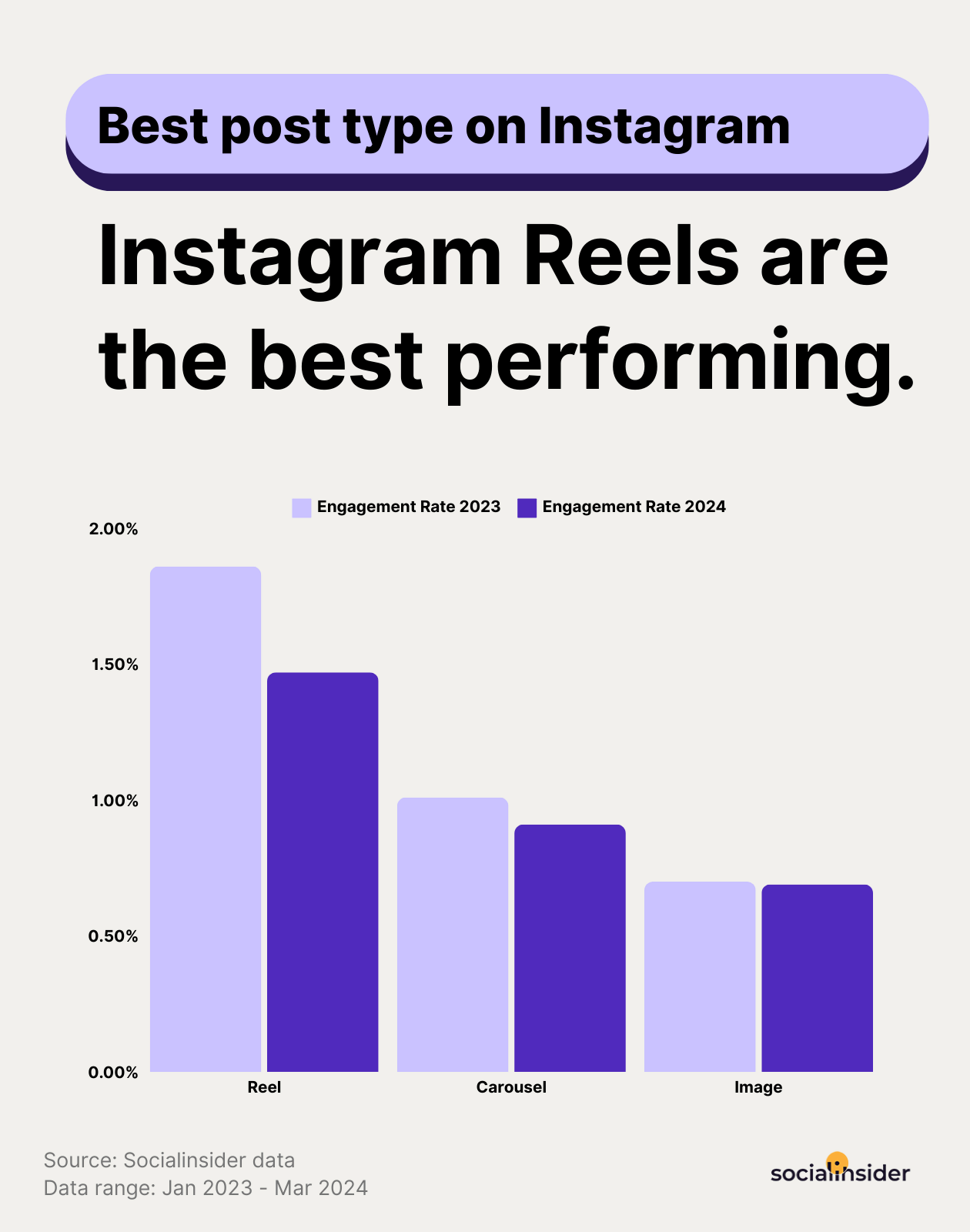
Similarly, on LinkedIn, multi-images and native documents generate the highest engagement rates, with a significant year-over-year increase in user interaction.
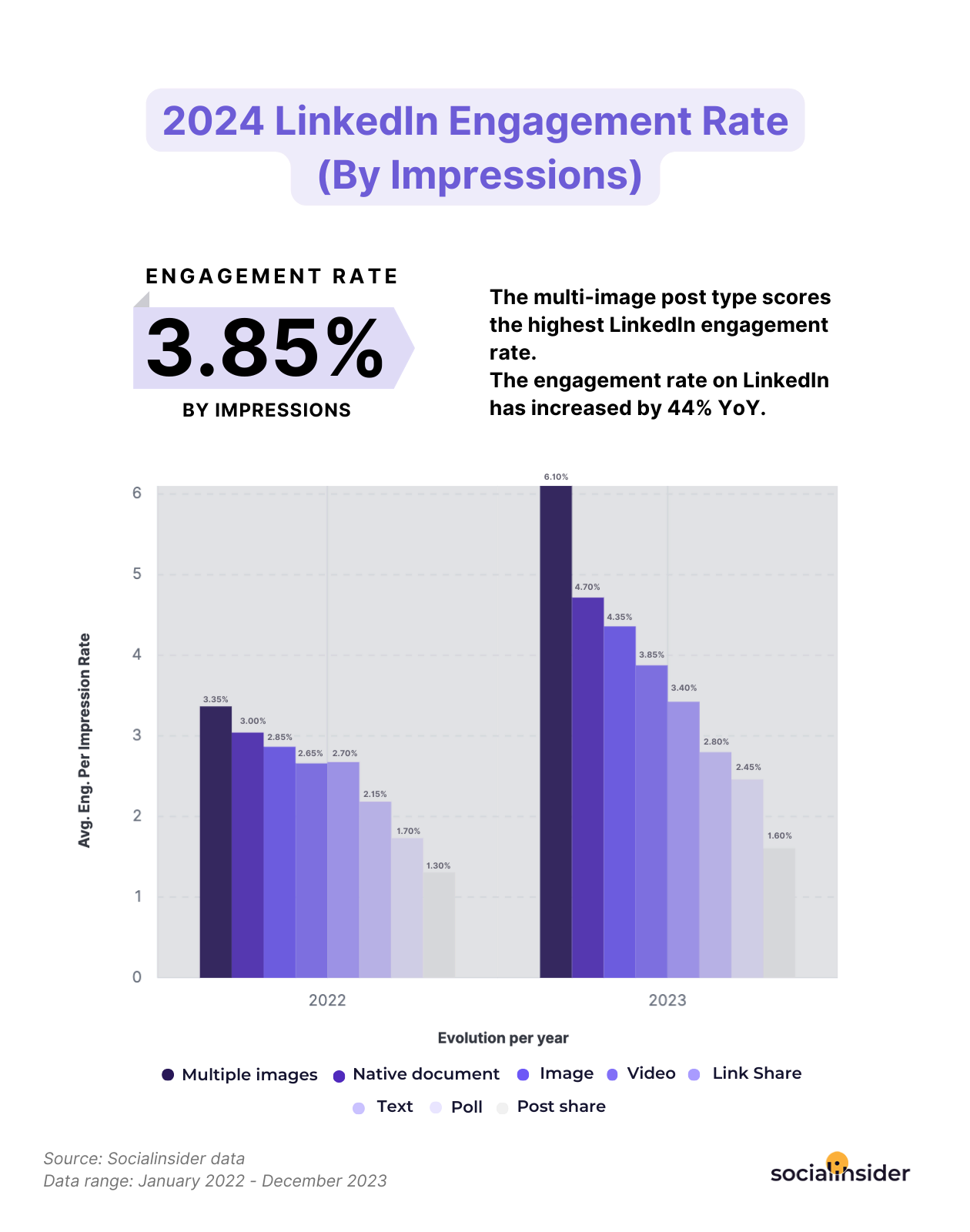
Overall, this approach helps boost your organic reach and makes your social media marketing more effective.
Integrate videos into your content strategy
Social media marketing best practices include integrating videos into your content strategy.
In fact, video content consistently outperforms other formats across platforms, providing a dynamic and engaging experience that resonates deeply with audiences.
Our recent studies have shown that, both on Facebook and Instagram, video content has emerged as the top-performing medium in terms of engagement.
And that’s because social media users crave immersive experiences, and video content fulfills that need by delivering stories, products, and messages in a way that keeps them hooked.
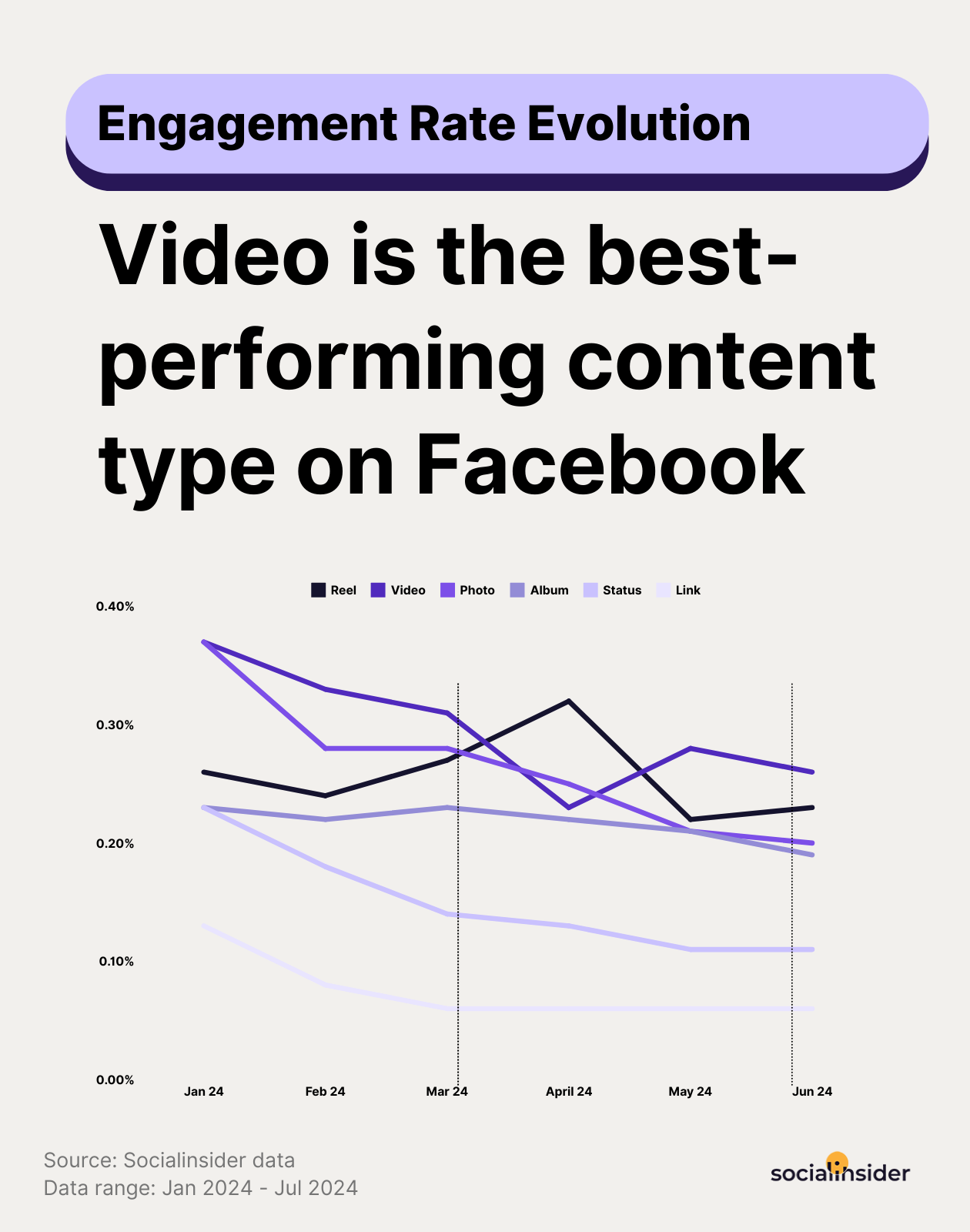
Mix evergreen and trends-aligned content
One of the best social media marketing strategies is to blend evergreen content with trends-aligned posts.
According to our research regarding the state of social media, evergreen content, like educational posts or behind-the-scenes glimpses into a company's culture, resonates deeply with people.
This can be seen in the high percentages for educational content (51%) and behind-the-scenes insights (49%).
It offers timeless relevance, answering the audience's core questions and positioning the brand as an authority.
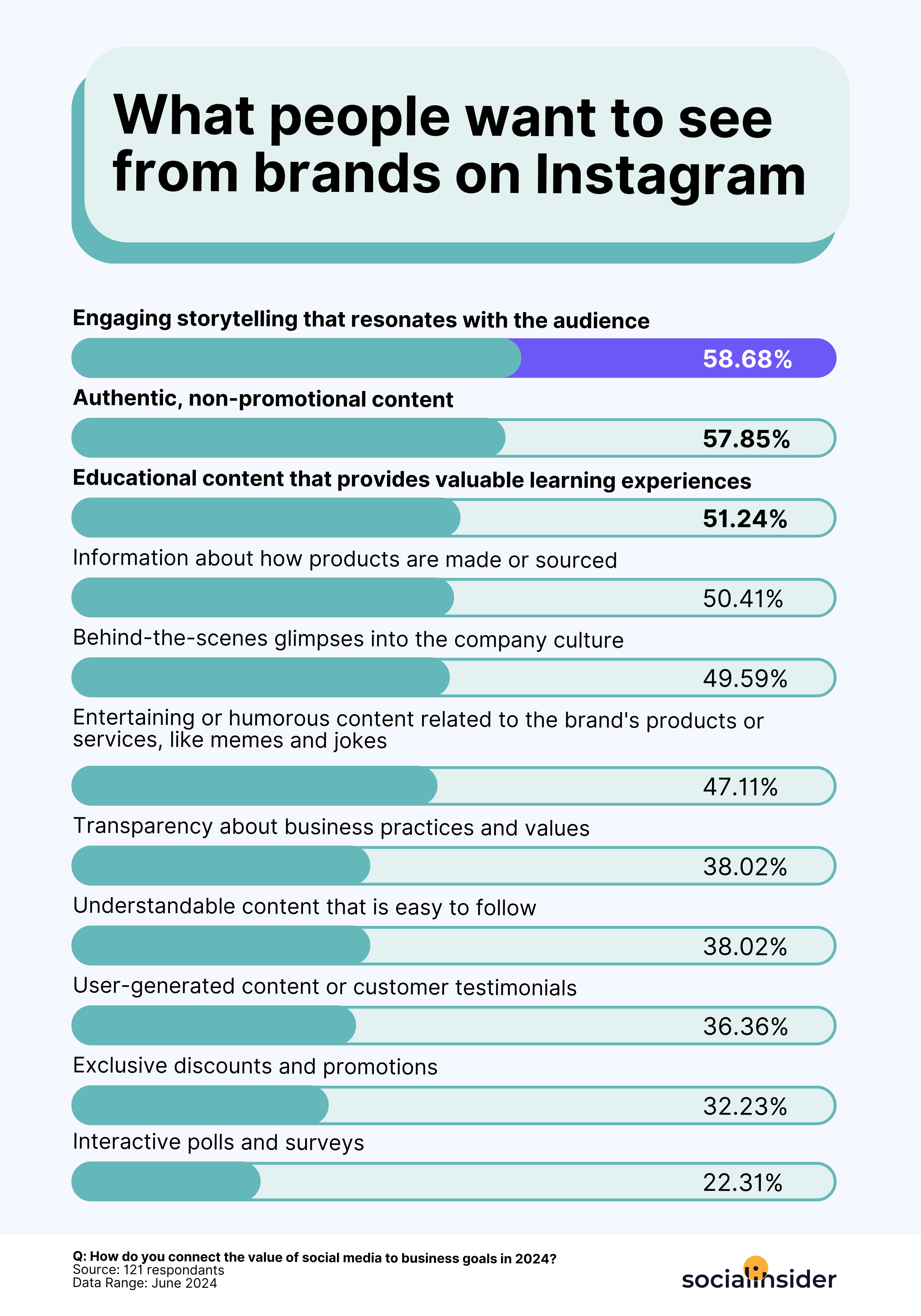
However, trends play a significant role in boosting visibility and keeping a brand current.
While trends can capture short-term attention and drive engagement, it’s essential to choose ones that align with the brand’s personality.
Our findings show that 57% of people want authentic, non-promotional content, indicating the importance of staying genuine even when hopping onto trends.
Thus, by mixing evergreen and trends-based content, brands can stay relevant in the fast-paced social digital marketing world without compromising authenticity or long-term value.
Foster engagement
People today expect more from brands than just promoting products on social media—they want genuine connections and meaningful interactions.
Consumers want to engage with brands that share their values, listen to their feedback, and provide personalized experiences.
This is why fostering engagement is one of the top social media advertising tips you need to know.
By actively engaging with followers and responding to their needs, brands can strengthen loyalty and trust.
This approach is essential to promote your business with digital marketing, as it transforms a brand from a mere provider into a valued part of the consumer's lifestyle.
Capitalize on UGC
Capitalizing on user-generated content (UGC) is one of the smartest social media marketing ideas.
That’s because it harnesses the power of word-of-mouth, which has a strong influence on the image of a brand.
When customers share their positive experiences with a product, it builds trust and authenticity in a way traditional promotion on social media can't.
By advertising your business on social media using real customer testimonials and reviews, you can amplify your reach and credibility.
UGC not only engages your audience but also encourages others to share their experiences, making your brand more relatable and approachable.
Experiment with ads
So you’ve tried everything organic, and now it’s time to take things up a notch—this is where advertising in social media comes into play, and it’s a great thing to include in your strategy.
Social media promotions give you access to highly targeted audiences, opening the door to boosting sales and expanding your social media reach with precision.
But here’s the catch: these strategies work best when you’ve already built a solid foundation.
With that base in place, you can experiment with different creatives, messaging, and formats to see what clicks, turning data into actionable insights.
This fine-tunes your approach, ensuring every dollar spent gets you closer to that sweet spot of maximizing social media ROI.
When done right, advertising via social media becomes a smart, scalable tool that fuels your growth, not just a quick fix.
The best social media marketing platforms
The best social marketing platforms can vary depending on your business goals, target audience, and the type of content you plan to share.
However, several platforms have established themselves as powerful tools for businesses looking to enhance their social advertising efforts.
Here's an overview of some of the most effective platforms:
1. Facebook
- User base: Predominantly male (56.8%), with a significant user base aged 25-34. Global presence, especially strong in Asia.
- Best for: Brand awareness, advertising, and community building.
- Distinctive features: Diverse content types (text, images, videos), targeted advertising, Facebook Groups, and Facebook Marketplace.
2. Instagram
- User base: Favored by Gen Z and millennials. Users spend an average of 33.1 minutes per day on the platform.
- Best for: Visual content, brand storytelling, and influencer marketing.
- Distinctive features: High engagement rates, Stories, IGTV, Reels, and Shopping.
3. X (Twitter)
- User base: Mostly male (63%) and is most popular among those aged 25-34. Users spend an average of 34.1 minutes daily.
- Best for: Real-time communication, customer service, and trending topics.
- Distinctive features: Quick updates, hashtag usage for reach, Twitter Spaces for live audio conversations.
4. LinkedIn
- User base: Users are mostly 25-34 years old and male (56.3%). Seeing an increase in daily and Gen Z users.
- Best for: B2B marketing, networking, and professional content.
- Distinctive features: Company pages, LinkedIn articles, InMail for direct outreach, LinkedIn Learning.
5. TikTok
- User base: Young, with 18-24-year-olds being the largest age group. Gender distribution is nearly even, and it boasts the highest average daily usage time at 53.8 minutes.
- Best for: Viral content, brand challenges, influencer collaborations.
- Distinctive features: Short-form video content, high user engagement, For You Page for discoverability.
6. YouTube
- User base: Popular across various age groups, now seeing more male users (54.4%). Average daily usage is 48.7 minutes.
- Best for: Long-form video content, tutorials, and product reviews.
- Distinctive features: Second largest search engine, monetization opportunities, YouTube Shorts for short-form content.
Choosing the right social media platforms for marketing
When deciding on the best social media marketing networks for your brand, it's vital to consider your goals, the type of content you're able to create and share consistently, and where your target audience spends most of their time. Incorporating social media analytics into this decision-making process can provide valuable insights into platform performance and audience behavior.
Excelling on a select few social media marketing channels is more beneficial than overextending yourself across too many.
Each platform possesses unique features and adheres to best practices, making it essential to stay informed about the latest trends, algorithm changes, and relevant social media analytics to sustain an effective strategy for social.
This approach will enhance your efforts through focused engagement and strategic marketing with social media.
Social media marketing services: in-house vs. agency
Navigating the world of digital social marketing can feel like juggling a dozen balls at once.
Between building authentic community connections, tracking endless analytics, and staying on top of the latest platform changes, businesses using social media have to decide where to focus their energy—and where to bring in extra help.
While some tasks thrive under the close, daily attention of an in-house team, others are better handled by specialists with the right expertise and tools to make an impact.
Think of it like this: your internal team is the heart of your brand’s voice, creating content that feels genuine, overseeing day-to-day engagement, and staying aligned with your goals.
But when it comes to things like influencer campaigns or managing complex paid ads, sometimes it’s smarter to outsource to a team that does this day in, day out; it’s about giving each aspect of your social strategy the attention it deserves, from the right people, in the right place.
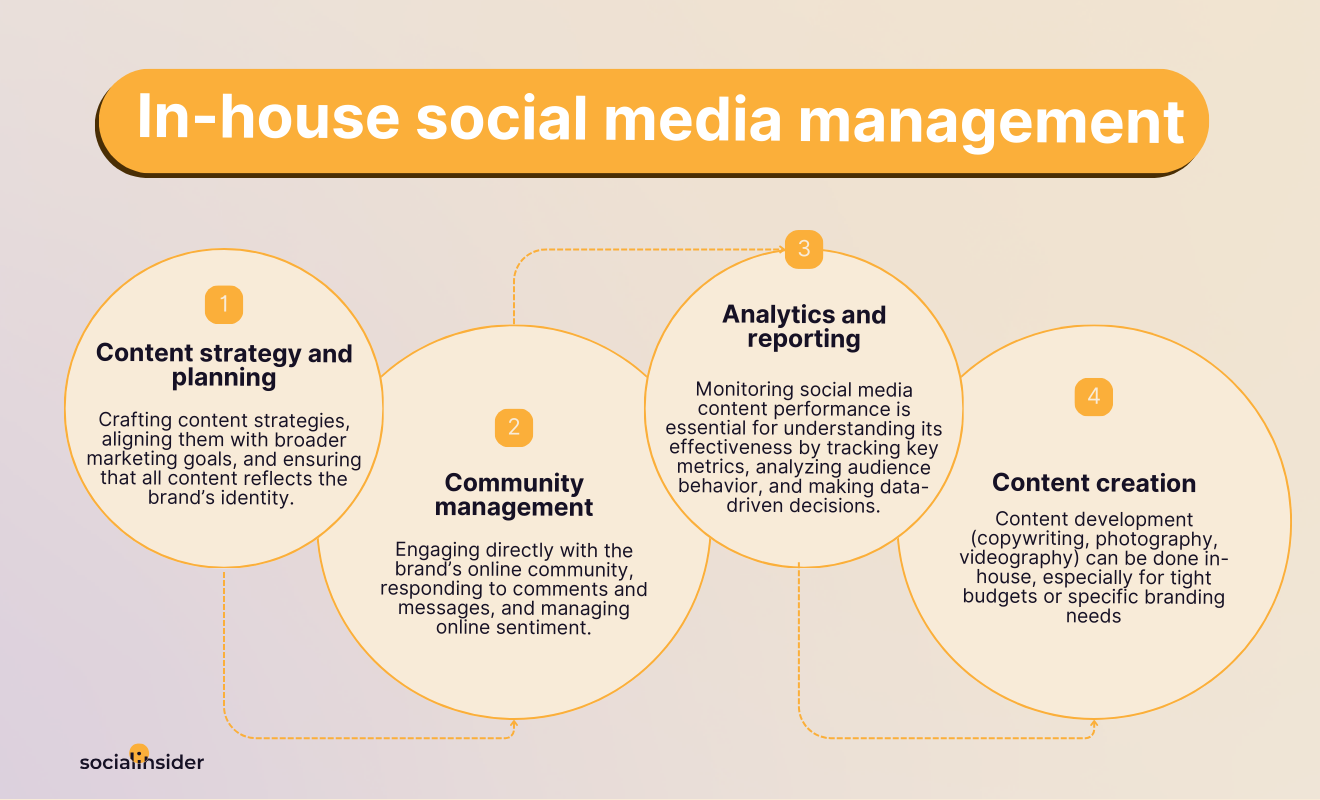
In-house social media management
For many brands, the core responsibilities of social media marketing management are best handled in-house.
This allows for direct control and a closer alignment with the company’s voice, culture, and goals.
Key tasks often managed internally include:
Content strategy and planning
Social media managers are responsible for crafting content strategies, aligning them with broader marketing goals, and ensuring that all content reflects the brand’s identity.
Many social media managers are expected to encompass multiple roles, from content strategy to project management, but the best ones understand each area enough to collaborate effectively with specialized teams. - Amy Peiffer, Social Media Lead

Community management
Engaging directly with the brand’s online community, responding to comments, messages, and managing online sentiment is often done internally to maintain a close connection with the audience.
For larger brands, social media managers oversee community coordinators and manage the overall execution of strategies. Their responsibilities include setting content and platform strategies, planning execution, and ensuring sufficient support for campaign implementation. -
— Alma Pantaloukas, Founder & Lead Strategist @Ritual Thrive

Analytics and reporting
Monitoring the performance of social media content is crucial to understanding its effectiveness. This can involve tracking key metrics, analyzing audience behavior, and making data-driven decisions.
Top 5 social media managers tasks are definitely content creation, reporting & analytics, social listening, content strategy, and community management. - Venessa Santiago, Digital Marketing Specialist @Well Go USA Entertainment
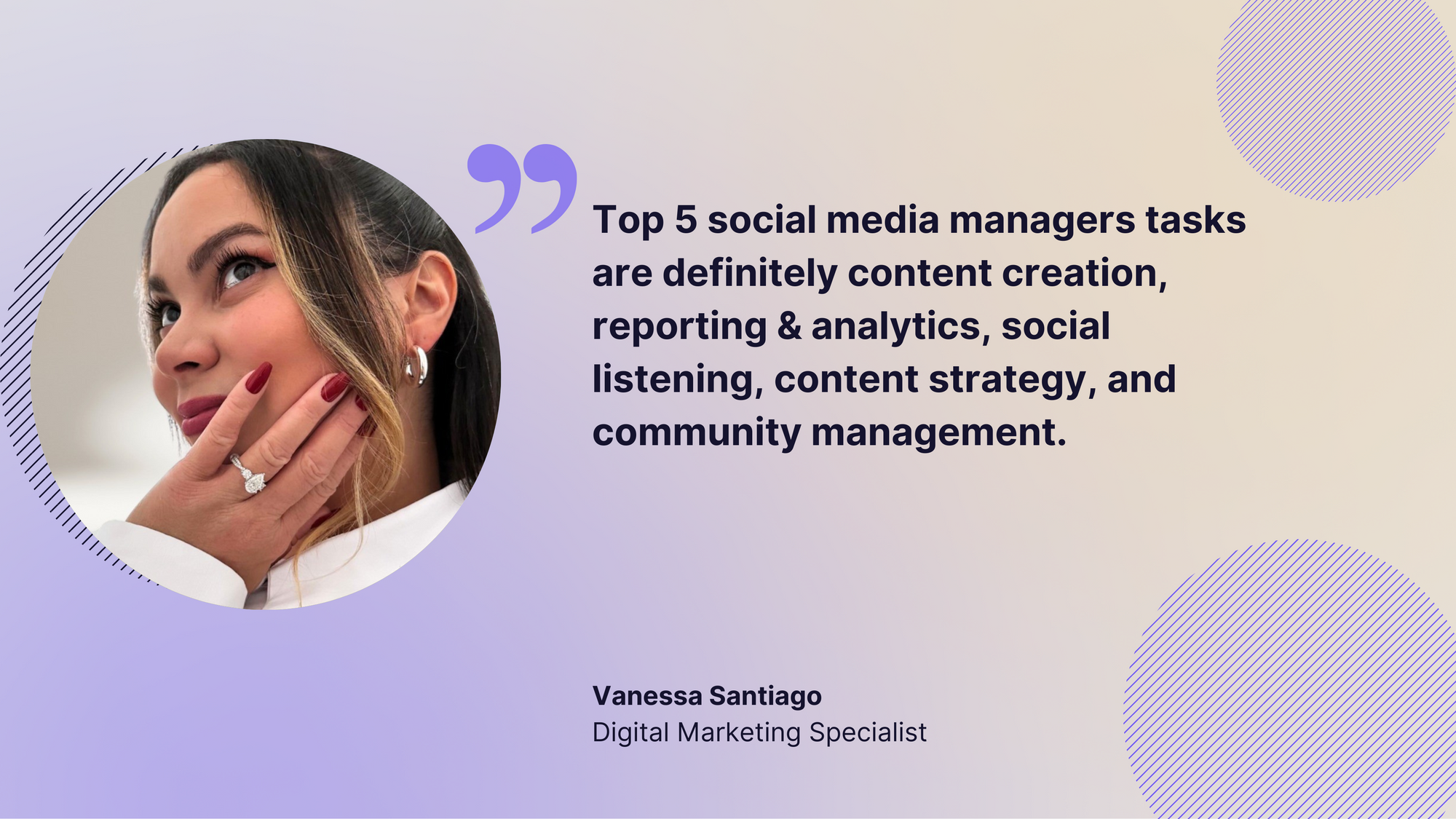
Content creation
While content development (copywriting, photography, videography) can be done in-house, especially when budgets are tight or for brands looking to create highly specific and branded material, outsourcing may also occur for larger, specialized projects.
Social media managers have to create an upto date and audience engaging social media strategy for their client, schedule posts, get to know the analytics from the different social media platforms then assist in content creation.
They don’t have to do it all themselves but they can work with the media team to bring out the best content for the platforms.- Atim Mercy, Communications & Content Strategist
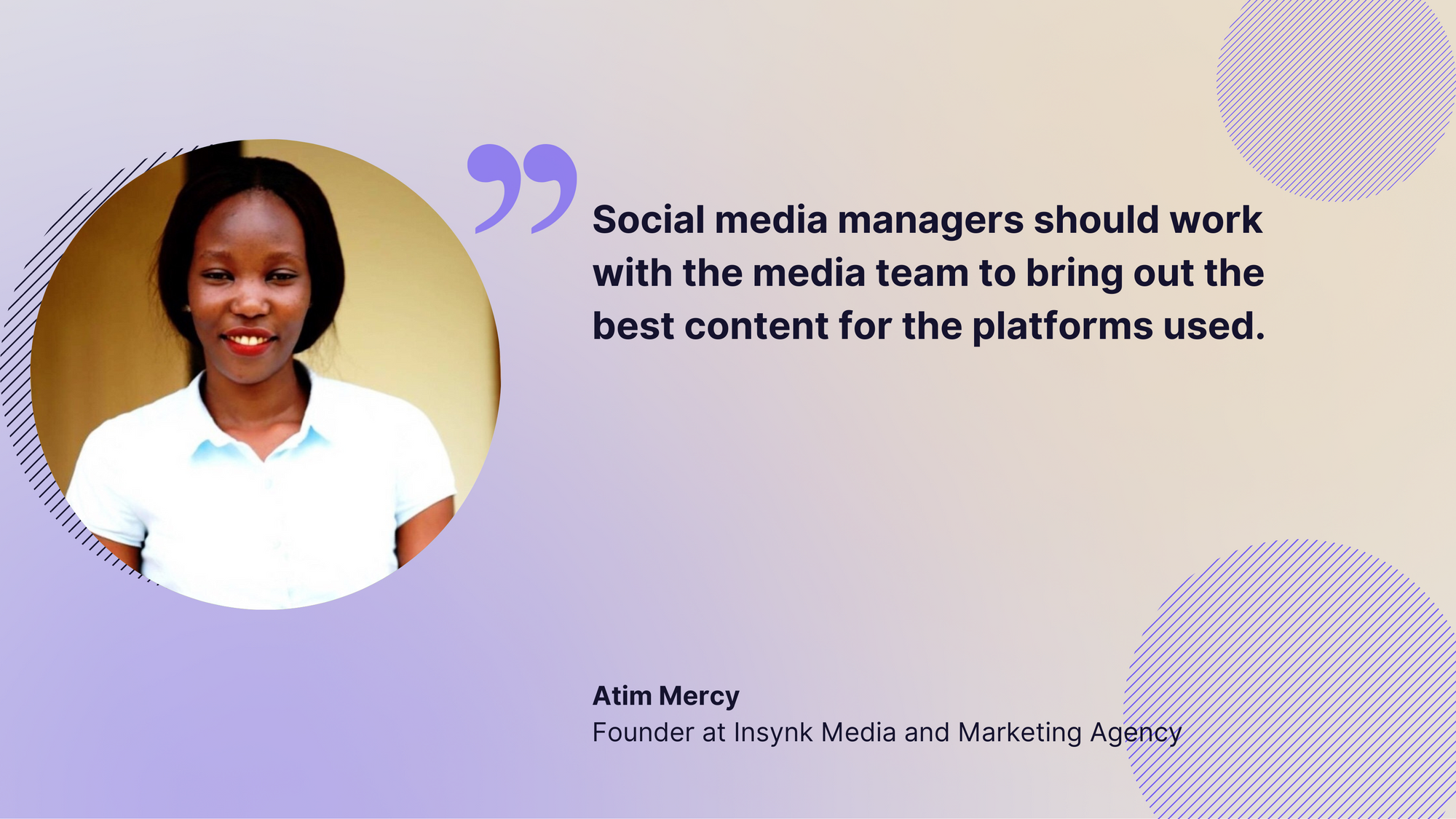
Outsourced services
Certain specialized services require expertise that in-house teams may not have the capacity or resources to execute effectively.
These are usually outsourced to agencies or specialists who can provide focused expertise and bring fresh perspectives to campaigns.
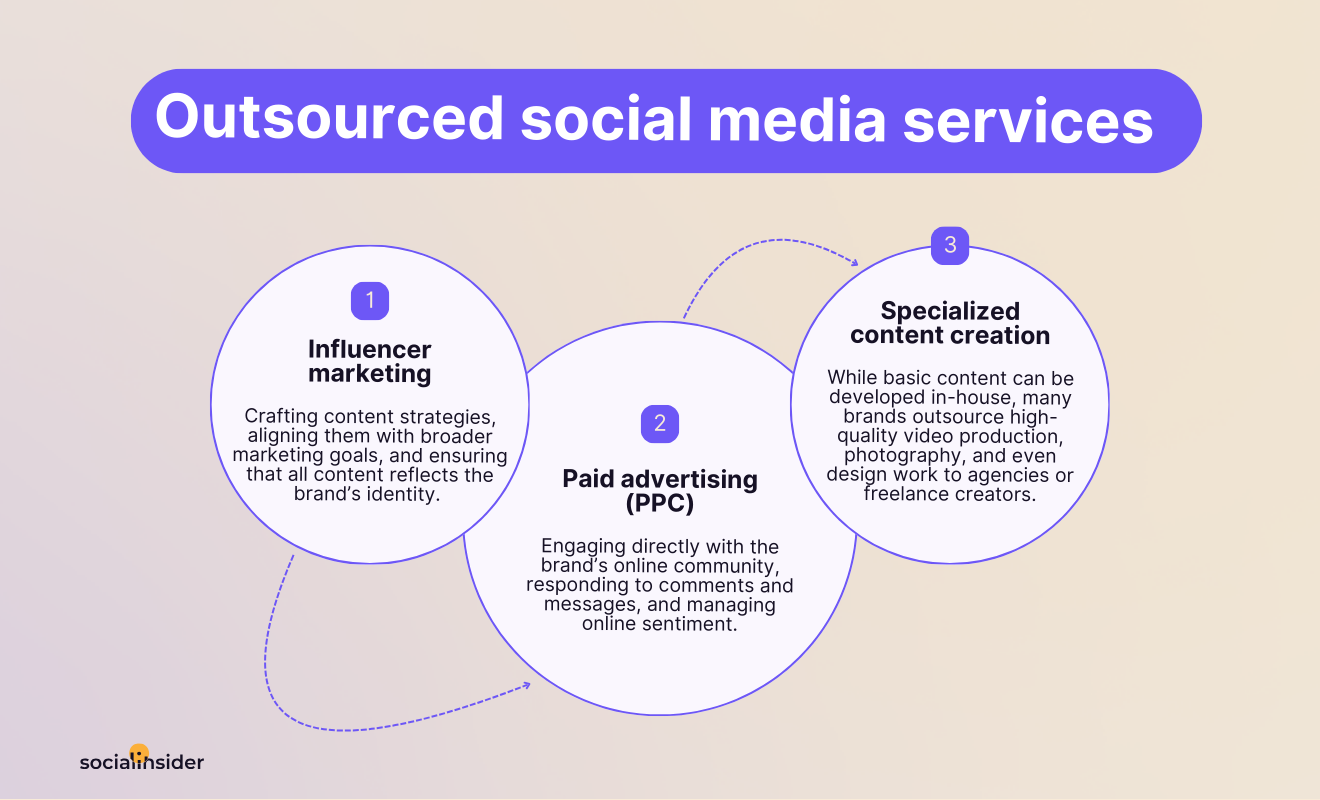
Influencer marketing
One of the most commonly outsourced social media activities, influencer marketing often requires agencies that specialize in identifying, negotiating with, and managing relationships with influencers.
These agencies have established networks and the ability to scale campaigns, making them a go-to for this kind of work.
Paid advertising (PPC)
Running and optimizing paid social media campaigns, particularly across multiple platforms, is complex and requires a high degree of specialization.
Specialized content creation
While basic content can be developed in-house, many brands outsource high-quality video production, photography, and even design work to agencies or freelance creators.
Social media marketing courses
For those keen on learning how to do social media advertising effectively, social media marketing classes and online resources abound, offering insights into successful social media marketing examples, strategies, and best practices.
These educational resources are invaluable for developing an action plan that resonate with your intended audience and achieve desired outcomes.
This is why we've compiled a diverse selection catering to different needs, from in-depth learning and content creation to mastering ads across platforms and more specialized focuses.
Here's a curated list:
- Social Media Marketing Specialization (Coursera): Best for those seeking comprehensive, in-depth learning, covering everything from analytics and engagement strategies to content creation and advertising, ending with a capstone project.
- Social Media Marketing – Content Marketing Masterclass (Udemy): Ideal for learning how to create engaging content that converts, covering a range of topics including email marketing, SEO, and blogging.
- Social Media Marketing Mastery (Udemy): Recommended for those interested in learning to write ads for multiple platforms, this course covers social advertising extensively across various platforms.
- Instagram Marketing 2022: A Step-By-Step to 10,000 Followers (Udemy): This course is perfect for those looking to grow their Instagram following, with comprehensive instructions on creating an appealing and effective Instagram presence.
- Advanced Social Media Certification Training (MarketMotive): This course is designed for digital marketing professionals seeking advanced knowledge in social media strategies. It delves into the philosophy behind social media promotion and teaches about creating sustainable strategies.
- Fiverr Learn – Social Media Content Strategy: This course, led by expert Rita Cidre, is great for those looking to develop and execute a content strategy for social media. It includes practical advice and exercises to help you create your own strategy as you learn.
- LinkedIn Learning – Social Media Marketing Foundations: Aimed at beginners, this course by Brian Honigman offers nearly two hours of content on creating a social media strategy that aligns with your business goals and introduces you to the basics of the major social media websites.
- Learning.ly – Social Media Success for Business: Under the banner of The Economist, this course provides a solid foundation for using social media in business, covering strategies, tools, and techniques tailored for brands, businesses, and nonprofits.
Conclusion
Effective social media marketing involves a blend of strategic planning, creative content creation, direct engagement with followers, and ongoing analysis and refinement.
By embracing the many opportunities that social media marketing presents, brands can forge stronger connections with their audiences, drive business growth, and navigate the digital age with confidence.
FAQs about social media marketing
How do I get started with social media marketing?
Beginning with social media marketing requires setting clear goals, identifying your target audience, and developing a coherent strategy that guides your actions. Understanding what you aim to achieve and who you are trying to reach is crucial to crafting a strategy that aligns with your business objectives.
What are some common social media marketing mistakes?
Common mistakes include not having a clear strategy, being inconsistent with posting, ignoring engagement from followers, posting one-size-fits-all content across all platforms, and not utilizing analytics to guide strategy adjustments. Avoiding these pitfalls can significantly improve the effectiveness of your social efforts.








